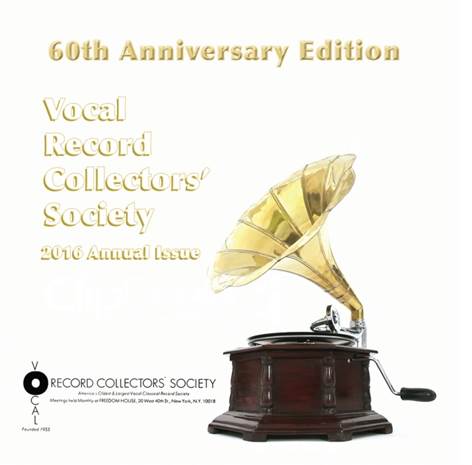
VRCS 60th ANNIVERSARY EDITION

there's the cliché : another jewel in the annual series issued by the VRCS. My absolute favorite is the final track of Mario Binci singing the "Addio alla madre". What a fine and underrated artist he was and what a fine tenor voice. There’s not one Italian tenor around right now with the same talent. Same can be said about baritone Ernesto Badini in "Pari siamo". Erik Ole Bye –unknown to me- is another revelation singing Grieg.
Rosa Chalia -a 'girl' of great charm and piquant manner can be heard in Fuente’s Habanera which she must have recorded at least three times.
It’s the first time I hear the singing of soprano Friedel Bohm. She sings Violetta’s "E strano" and is a much more refined and talented singer (trills !!) than coloratura Marie Keldorfer who sings a rather bland ‘Welche wonne, welche lust’. Another premiere for me is the sonorous singing of Hungarian Rikard Erdos in Hagen’s Nachtgesang.
I’m happy to see at least two of my “compatriots” are included. Emiel van Bosch in Faure’s "Les Rameaux" and José Beckmans displaying excellent, impressive enunciation as a “French” - in language and style- Boris.
Fine tenor singing is also represented by Jacques Urlus in Le Cid (Szell conducting!) and Max Hirzel displaying ease and finesse in Lohengrin’s ‘Atmest du nicht’. Both again are very rare recordings.
The compilation also includes Carmen’s “Air des cartes” a fine rendition by German Emma Scheild-Hausser and the Chanson Bohème performed with ease and the necessary abandon by Mildred Miller.
Florence Macbeth is charming and lively in Cécile Chaminade’s “L’été” (with orchestra!) an unpublished Electric Columbia.
Marcelle Denya is a winning, silvery and delicate Liù in ‘principessa l’amore” (1928). Malcolm McEachern is his impressive self in “Out on the Deep”
I have never heard Donald Dickson better than in this recording of "Per me giunto" (1941), much better than in his 1937 Carnegie concert opposite Maria Jeritza and Joseph Schmidt.
Margarethe Heyne-Franke provides power and steel but not much warmth in “Dich teure Halle (1930).
Operetta soprano Germaine Gallis for some reason is called a ‘chanteuse’ but she really was an operetta soprano of some renown in her days. Though the recording of Alfred Margis’s ‘Valse Bleue’ goes back to 1904 Gallis nevertheless succeeds in creating an atmosphere of the required “spumante” with the necessary bravura.
Others tracks include Carolina White as a commanding Aida in "Ritorna vincitor".
The included booklet while giving a lot of information in accordance with the usual VRCS standards is this time also marred by a number of factual and typographical errors.
Mildred Miller (track 20) is stated as singing the "Séguidille" from act one yet it is the "Chanson Bohème" from act two!! It is Emiel or Emile van Bosch and not Emil and the Flemish baritone was born in Boom (not Boon) and he studied with Henri (not Henry) Fontaine and Miss Helyett by Audran is not an opera but an operetta.
Friedel Bohm is said to have sung the role of Eudora in Halevy’s La Juive. It is of course Eudoxie and Halévy. Max Hirzel’s bio says he sang at the Brussels Monnaie/Munt but I couldn’t find any appearances of the fine tenor in my country.
Other typos amongst others include french (French) , Felia (Félia) Litvinne, Marise (Maryse Beaujon), regiment (La Fille du Régiment), Brèsil (La Perle du Brésil) etc.
Nevertheless THE perfect X-mas or New Year's gift to any genuine vocal art devotee.
Rudi van den Bulck, December 2016